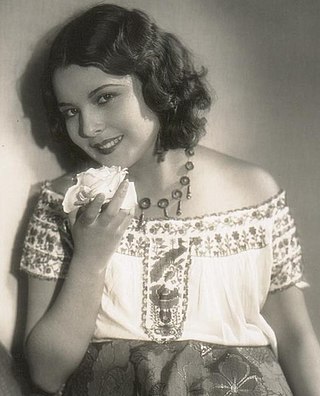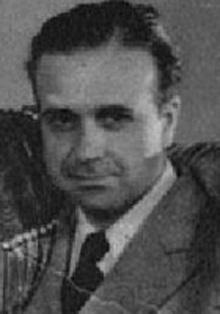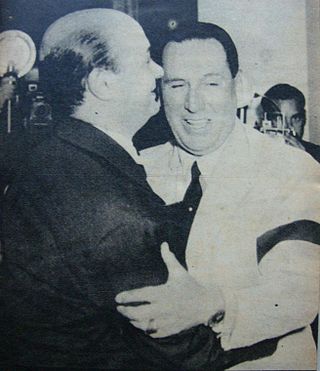Related Research Articles

Guadalupe Natalia Tovar Sullivan, known professionally as Lupita Tovar, was a Mexican-American actress best known for her starring role in the 1931 Spanish-language version of Drácula, filmed in Los Angeles by Universal Pictures at night using the same sets as the Bela Lugosi version, but with a different cast and director. She also starred in the 1932 film Santa, one of the first Mexican sound films, and one of the first commercial Spanish-language sound films. At the time of her death, she was the oldest living actress and one of the last surviving stars from the Golden Age of Mexican cinema and from the Golden Age of Hollywood.

Emilio "El Indio" Fernández Romo was a Mexican film director, actor and screenwriter. He was one of the most prolific film directors of the Golden Age of Mexican cinema in the 1940s and 1950s. He is best known for his work as director of the film María Candelaria (1944), which won the Palme d'Or award at the 1946 Cannes Film Festival. As an actor, he worked in numerous film productions in Mexico and in Hollywood. He was the father of the Mexican actor Jaime Fernández.

Eduardo Noriega Gómez is a Spanish actor. He gained notoriety in Spain for his performance in Thesis (1996), which was followed by roles in Open Your Eyes (1997) and The Wolf (2004).

Chris-Pin Martin was an American character actor whose specialty lay in portraying comical Mexicans, particularly sidekicks in The Cisco Kid film series. He acted in over 100 films between 1925 and 1953, including over 50 westerns.

Carlos Francisco Borcosque Sánchez was a Chilean film director and screenwriter involved in the production of the Cinema of Argentina.

Laura Ana "Tita" Merello was an Argentine film actress, tango dancer and singer of the Golden Age of Argentine Cinema (1940–1960). In her six decades in Argentine entertainment, at the time of her death, she had filmed over thirty movies, premiered twenty plays, had nine television appearances, completed three radio series and had had countless appearances in print media. She was one of the singers who emerged in the 1920s along with Azucena Maizani, Libertad Lamarque, Ada Falcón, and Rosita Quiroga, who created the female voices of tango. She was primarily remembered for the songs "Se dice de mí" and "La milonga y yo".
Centauros del pasado is a 1944 Argentine historical biopic film directed by Belisario García Villar, with a screenplay by Villar, Eliseo Montaine, and Roberto Talice, as based upon the original historical novel by Montaine and Talice about Pancho Ramirez, a governor of Argentina's Entre Ríos Province during the Argentine War of Independence, and founder of the Republic of Entre Ríos.

A Butterfly in the Night is a 1977 Argentine comedy-drama film directed by and starring Armando Bo alongside Isabel Sarli.
María Abella de Ramírez was an Uruguayan feminist, noted for her role in establishing Uruguayan and Argentine women's groups in the early 1900s.
Don Pancho Talero was a comic strip created by Argentinian cartoonist Arturo Lanteri, which centred on the family of a sailor named Don Pancho Talero. It appeared in the magazine El Hogar between 1922 and 1944. Three films were also created based on the character: Las aventuras de Pancho Talero (1929), Pancho Talero en la prehistoria (1930) and Pancho Talero en Hollywood (1931).
Antonio Ber Ciani was an Argentine actor and film director. He is known for films such as Don Bildigerno de Pago Milagro.
Arturo Lanteri (1891–1975) was an Argentine cartoonist and film director. As a comics artist he is best remembered for his series Les Aventuras de Negro Raúl, Don Pancho Talero and Anacleto.

Lumiton is a former film production company and current museum located in Munro, Buenos Aires, Argentina. Lumiton Studios was founded in 1932 at the start of the golden age of film in that country. Its lowbrow, populist films appealed to local audiences and were highly successful in Argentina and throughout Latin America. It was the main competitor to Argentina Sono Film in the 1940s.

Vicente Padula was an Argentine film actor. Padula moved to the United States, and appeared regularly in Hollywood films. He also made films in Mexico. Padula was a friend of the Argentine film star Carlos Gardel and appeared in several of his American films including Suburban Melody (1933) which was one of the highest-grossing film in their native Argentina that year.

Ovidio Cátulo González Castillo was an Argentine poet and tango music composer. He was the author of many famous works, such as Organito de la tarde, El aguacero, Tinta roja and Caserón de tejas, María and La última curda, and El último café. The tango La calesita, which he composed with Mariano Mores, inspired the film of the same name directed in 1962 by Hugo del Carril.
El cielo es para todos is a Mexican telenovela produced by Valentín Pimstein for Televisa in 1979.

Amanda Varela was an Argentine actress who primarily worked during the Golden Age of Argentine Cinema, performing on stage and in films of Argentina and the US. She made 9 films in Argentina and 2 in the US and appeared on stage in numerous productions in both countries. Varela is usually credited with helping her sister, Mecha Ortiz, secure her first acting roles. In the 1950s, Varela retired from acting, moved to the United States, and became a matrimonial judge.

Chita Foras (1900–1986), was an Italian-Argentine actress noted for her work in silent and sound films.
Catch the Heat, also known as Feel the Heat, Sin escape and Narcotraficantes, is a 1987 Argentine-American action film directed by Joel Silberg and written by Stirling Silliphant. It stars Tiana Alexandra, David Dukes, Rod Steiger and Brian Thompson. It was also released with the alternative titles Sentir la persecución and Misión: Alto riesgo.
References
- ↑ Manrupe, Raúl; Portela, María Alejandra (2001). Un diccionario de films argentinos (1930-1995) (in Spanish). Editorial Corregidor, Buenos Aires. ISBN 950-05-0896-6 . Retrieved 20 January 2013.
- 1 2 3 4 Finkielman, Jorge (2004). The Film Industry in Argentina: An Illustrated Cultural History. McFarland. p. 147. ISBN 978-0-7864-1628-8.
- ↑ Horn, Maurice (1976). The World Encyclopedia of Comics. Chelsea House Publishers. p. 219. ISBN 978-0-87754-042-7.